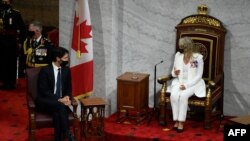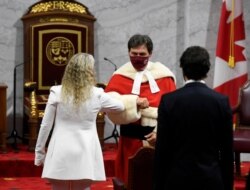Canadian Prime Minister Justin Trudeau unveiled a plan Wednesday to address social inequalities laid bare by the coronavirus pandemic and create 1 million jobs during recovery, while also extending emergency measures for a second wave of COVID-19.
In the so-called throne speech, read by Governor General Julie Payette at a joint sitting of MPs and senators, Trudeau's government vowed to eliminate homelessness, hasten Canada's fight against climate change and introduce national child care and pharmacare programs.
It said it aims in the short term to also restore employment to pre-pandemic levels, and both extend and broaden emergency aid measures to keep the economy rolling.
"This is our generation's crossroads," Payette said in the speech.
"Do we move Canada forward, or let people be left behind? Do we come out of this stronger, or paper over the cracks that the crisis has exposed?" she said. "This is the opportunity to contain the global crisis and build back better, together."
Infrastructure, training, hiring
The plan calls for direct infrastructure investment, training to quickly equip workers with new skills, and incentives for employers to hire and retain workers.
Exceeding Canada's 2030 carbon emissions reduction target of 30% below 2005 levels will also be a "cornerstone" of job creation efforts, according to the speech.
"The economic restart," Payette said, "is now well underway."
"This is not the time for austerity," she said, hinting at additional debt-financing for Canada's recovery, alongside taxing "extreme wealth inequality."
"This COVID-19 emergency has had huge costs," Payette said. "But Canada would have had a deeper recession and a bigger long-term deficit if the government had done less."
The government, she added, will "do whatever it takes, using whatever fiscal firepower is needed to support people and businesses during the pandemic."
‘Bold new solutions'
Wednesday evening, Trudeau was to give a separate and rare televised address to the nation to stress the urgency in fighting the pandemic.
Polling shows most Canadians are satisfied with Trudeau's management of the crisis so far. But the "bold new solutions" outlined in the throne speech will require Parliament's nod in the coming weeks.
If all three opposition parties reject his minority Liberal government's New Deal-style reforms, Canada will be heading to the polls in the middle of the pandemic.
The Tories and the Bloc Quebecois said they would vote against the plan, while the New Democrats urged even more social spending and paid sick leave for all in order to get their support.
It is arguably an awkward time for sweeping policy changes, or as critics suggested, to dare the opposition to force snap elections.
Earlier Wednesday, chief public health officer Theresa Tam warned of a potential "big resurgence" in coronavirus cases without strong actions to limit spread of the virus.
"The national daily case count has been increasing at an accelerated rate," Tam said, as millions of Canadians returned to work and school this month.
The Conservatives elected a new leader only last month: Erin O'Toole, who is not well known to Canadians.
Both O'Toole and Bloc Quebecois leader Yves-Francois Blanchet are isolating after testing positive for COVID-19 and did not attend the speech.
Support from lawmakers
Trudeau, however, insisted he needs to test parliamentary support for his policy goals, as Canada's circumstances are dramatically different than when he won his mandate last year.
Under the pandemic, the country's jobless rate peaked at 13.9% in May, while the economy contracted at a record 38.7% in the second quarter.
Ottawa has already doled out more than $230 billion in emergency aid in the last six months.
The costs of the new measures are to be outlined in an upcoming budget.
An Abacus Data poll, meanwhile, indicated that if an election were held now, it most likely would result in another minority Liberal government.





